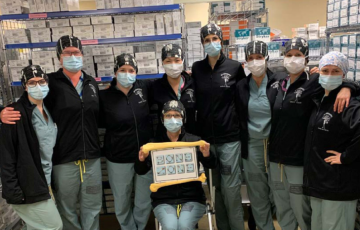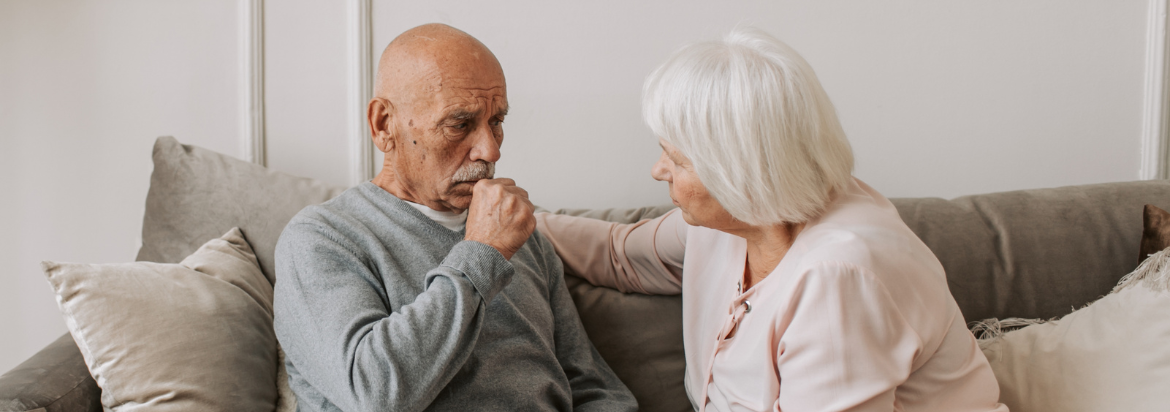Short of Breath?
You could have Chronic Obstructive Pulmonary Disease (COPD), a chronic lung disease that often goes undiagnosed. Smokers or ex-smokers over 40 are at highest risk.
COPD is a lung disease that includes respiratory disorders such as chronic bronchitis and emphysema. About 138,500 people in BC are living with COPD. More than 10,000 new cases were reported last year in the province. Many people do not know they have COPD until they experience an acute episode.
Do you think you may have COPD?
If you are over 40 and smoke currently, are an ex-smoker, or have been exposed to lung irritants, you may have COPD. Non-smokers can also get COPD. We recommend you take the 30 second Lung Health Test.
- Do you cough regularly?
- Do you cough up mucous/phlegm regularly?
- Do even simple chores make you short of breath?
- Do you wheeze when you exert yourself (exercise/go up stairs)?
- Do you get many cold, and do your colds last longer than your friends’ colds?
If you answered “yes” to one or more of these questions, you may have symptoms of COPD. See you Family Physician to find out what is causing your symptoms. It could be COPD, it could be another breathing disease or something else, but only your Doctor can say.
Please Note: This test is for information only- it should not replace a medical exam by a Doctor/Nurse Practitioner. Please consult your Doctor/Nurse Practitioner to discuss.
- What is COPD?
-
COPD stands for Chronic Obstructive Pulmonary Disease.
COPD occurs when your airways are exposed to pollutants such as smoke from cigarettes, fire or other irritants, they become inflamed, red and swollen. Your airways then become filled with thick sticky mucous that you need to cough to clear the mucous. This mucous stays stuck in your airways often blocking the airflow and trapping air. Your airways branch into smaller and smaller tubes, which end in millions of air sacs, called alveoli. The alveoli exchange air. Your alveoli can also be damaged and destroyed by these irritants which results in poor air exchange and the lost of elasticity trapping air in the lungs.
Approximately 6% of all British Columbians over the age of 45 years have COPD.
Learn more about COPD.

Image from www.livingwellwithCOPD.com

Image from www.livingwellwithcopd.com/en/what-is-copd.html
- Diagnosis
-
Diagnosis of COPD is from a breathing test known as spirometry. During this test, clients take a big breath in and blows all the air out into a tube attached to a machine. The more blocked your airways are, the longer it takes to blow the air out.

- Signs and Symptoms
-
The most common symptoms of COPD are:
- Shortness of breath
- Cough
- Mucous production
Self-management
- Smoking Cessation
-
Smoking cessation is the main cause of COPD and main factor for disease progression so quitting smoking is the best thing someone with COPD can do for their health.
Resources:
- Respiratory Rehabilitation
-
“Take Heart & Breathe Well” exercise programs run out of Recreations centres across Vancouver Island. Take Heart Breathe well offers exercise programs to those with Respiratory and Cardiac diseases. Look in your local community recreation centre activity guide for programs and the resources below.
Program Resources:
Educational Resources:
- Immunization and Vaccination
-
People with COPD are at a higher risk of complications from the flu and pneumonia. Please talk to you Family Physician to ensure your vaccinations are up to date.
- COPD Telemonitoring program
-
Island health offers telemonitoring program for people with COPD. This is a program where you learn to recognize early signs and symptoms of a COPD flare up and learn how to treat a flare up while being supported by nurses.

Treatment
COPD can’t be cured, but it can be treated so you can live a fulfilling life. The best treatment includes smoking cessation, taking your COPD medications as prescribed by your Doctor/Nurse Practitioner, staying active, and preventing and treating flare ups early.
- Medications
-
Medications can help to improve your symptoms and quality of life.
You should know the following about your medications:
- The name of each medication you are taking.
- What your medication does.
- The dose you should be taking
- When you should be taking your medication.
- How to take your medication properly.
- Medication precautions and side effects.
It is very important to take the regularly and exactly as they are prescribed.
Your health professional can help you to acquire a better routine to make sure to take your medications on a regular basis.
If you have any concerns about your medications, ask your doctor and/or pharmacist.

- Inhaler Techniques
-
Breezhaler
Diskus
Ellipta
Genuair
Handihaler
Metered Dose Inhaler with Spacer
Respimat
Turbuhaler
- Flare Ups
-
Flare ups or COPD Exacerbations are when there is an increase in symptoms from your usual/normal. It is very important for you to know what your normal symptoms are so you can be aware when they change. Discuss a flare up plan with your Doctor/Nurse Practitioner and they will prescribe medications and explain to you how to manage a flare up.
An example of a COPD Flare Up Action Plan follows a street light path:
- Green - My COPD is well controlled. Your symptoms are in their usual state, you continue to use your medications as prescribed by your Physician.
- Yellow - My symptoms are worse. Take action, there are some changes in your symptoms and your medications need to be changed and/or increased. Your Physician will leave clear directions here on what actions you should take.
- Red - Danger. Take action and get help. Call 911 or go to the emergency department.
Tips for after a COPD Flare Up.
Island Health Resources
Respiratory Education Centre
Victoria at Royal Jubilee Hospital
Contact: 250-370-8265
Respiratory Therapy in Community – RTiC
Central Island (Nanaimo, Oceanside)
Contact: 250-739-5749
Toll free 1-877-734-4101
North Island (Comox, Campbell River, Mount Waddington)
Contact: 250-331-8570
Toll Free 1-866-928-4988
Other Resources
BC Lung
Living Well with COPD
Health Literacy & Chronic Disease Management: COPD resources available in numerous languages.
Pursed Lips Breathing
Respiratory Education Centre (REC)
Find Cardiac Rehab resources on our Cardiac Rehabilitation Program page.
Other Exercise Resources
- Cardio and Core for COPD
-
{"preview_thumbnail":"/sites/default/files/styles/video_embed_wysiwyg_preview/public/video_thumbnails/3FGL2GpA904.jpg?itok=klwLtF6o","video_url":"https://www.youtube.com/watch?v=3FGL2GpA904","settings":{"responsive":1,"width":"854","height":"480","autoplay":0},"settings_summary":["Embedded Video (Responsive)."]}
- Living Well with COPD
-
Living Well with COPD has numerous exercise and educational videos. Sign up for free to access them.
- Low-Moderate Intensity Cardiac Rehab Home Program
-
{"preview_thumbnail":"/sites/default/files/styles/video_embed_wysiwyg_preview/public/video_thumbnails/Z9nxS5tmQRI.jpg?itok=hZruubH_","video_url":"https://www.youtube.com/watch?v=Z9nxS5tmQRI","settings":{"responsive":1,"width":"854","height":"480","autoplay":0},"settings_summary":["Embedded Video (Responsive)."]}
- Pulmonary Rehab Home Program
-
{"preview_thumbnail":"/sites/default/files/styles/video_embed_wysiwyg_preview/public/video_thumbnails/aEwhaAvmpqs.jpg?itok=ZPy8swwV","video_url":"https://www.youtube.com/watch?v=aEwhaAvmpqs","settings":{"responsive":1,"width":"854","height":"480","autoplay":0},"settings_summary":["Embedded Video (Responsive)."]}
- Strength Training for COPD
-
{"preview_thumbnail":"/sites/default/files/styles/video_embed_wysiwyg_preview/public/video_thumbnails/iO8FVOStIRs.jpg?itok=lZh49L1J","video_url":"https://www.youtube.com/watch?v=iO8FVOStIRs","settings":{"responsive":1,"width":"854","height":"480","autoplay":0},"settings_summary":["Embedded Video (Responsive)."]}









